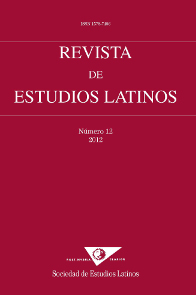Support verbs and syntactic incorporation in Latin: the case of ludos facere
DOI:
https://doi.org/10.23808/rel.v12i0.87788Keywords:
support verbs; syntactic incorporation; test; Latin; ludos facere.Abstract
In Latin, ludos facere seems to form a support verb construction. In this paper, however, I will show that two different predicate frames lie behind this construction. These two syntactic structures are, in fact, the two poles of a continuum between the frequent use of certain predicates and the syntactic incorporation. On the one hand, the analysis of these predicate frames will allow me to verify, in a corpus language such as Latin, the validity and range of the criteria that are used in other languages to characterise a support verb construction. On the other hand, the formal, semantic, syntactic and pragmatic differences between the two constructions help to explain the apparent ambiguity of some examples from Plautus.
Downloads
Downloads
Published
How to Cite
Issue
Section
License
Copyright (c) 2012 Revista de Estudios Latinos

This work is licensed under a Creative Commons Attribution-NonCommercial-NoDerivatives 4.0 International License.
The originals published in the printed and electronic editions of this journal are the property of the Revista de Estudios Latinos and can be circulated as long as the original source and authorship is made clear in any reproduction, full or partial, of the same, and as long as this is not done for commercial purposes.






